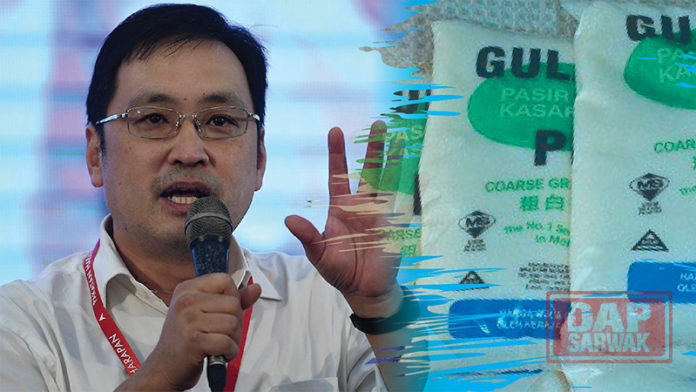Press Statement by Deputy Minister for Domestic Trade and Consumer Affairs Chong Chieng Jen:
In respond to the press statement of the 2 local sugar refiners yesterday, I wish to state that the Government will not re-consider its decision to grant sugar import permits for Sarawak food and beverage (F&B) manufacturers. On the contrary, we believe that a little competition in the sugar industry will do more good than harm to the country, the business sector and the consumers at large.
So far, the 2 sugar refiners, MSM Malaysia Holdings Bhd (MSM) and Central Sugar Refinery Sdn Bhd (CSR) have enjoyed the monopolistic control over the sale and supply of sugar in Malaysia’s domestic market. This is another ofthe previous administration’s legacy.
However, it is the general policy of the Pakatan Harapan Government to encourage more competition, reduce costs of doing businessand enhance efficiency in all sectors. In this globalised market, no country canafford to have protectionism policy go on forever. Such protectionism policy will surely breed inefficiency for which the general public will be forced to bear the unnecessary costs.
The international raw sugar prices has fallen by more than 35% from US$ 0.45 per kg in February, 2017 to less than US$ 0.30 per kg since February 2018 till now. In its annual report, MSM indicated that raw sugar constitutes 88% of its production costs for refined sugar.
Yet, despite the huge fall in its production costs for more than 1 year, the proportionate benefits of the reduced price were not passed on to the F&B manufacturers. This is especially the case for the F&B manufacturers in Sarawak who have no bargaining power vis-à-vis the 2 sugar refineries due to the former’s relatively small volume of purchases.
With the new policy to allow the F&B manufacturers in Sarawak to directly import sugar from foreign sugar refiners, this will provide substantial savings for these F&B manufacturers and reduce their costs of business.
A quick check with one of these manufacturers reveals that it has just entered into a contract to purchase sugar from the largest sugar refiner in Thailand at the approximate price of US$ 400 per ton (RM1,700.00) (inclusive of transport charges). Before that, it was buying sugar from one of the local refiners at the price of more than RM2,700 per ton. With the sugar import AP, there is now a savings of RM1000 per ton and that manufacturer’s production requires 300 ton of sugar per year.
My question to the 2 local refiners is:
If the Thailand refiner can sell their sugar at the price of RM1,700 per ton (inclusive of transport charges), why are the local refiners selling their sugar at RM2,700 per ton?
Extra Profits for Price Stabilisation Function?
One of justifications given by the local refiners for selling sugar at such high price is that, when international sugar price goes up, they are the ones who absorb the price fluctuation to maintain supply. Therefore, they are now entitled to make extra profits when international sugar price goes down.
This argument is untenable.
At present, international raw sugar prices is US$ 0.28 per kg. For the past 5 years, the average raw sugar prices are as follows:
Year *Price of Raw Sugar(US$ /kg)
2014 *0.37
2015 *0.29
2016 *0.39
2017 *0.35
2018 *0.27
** Sources from Indexmundi
With international raw sugar price at US$ 0.40 per kg, the reasonable refiners’ price should not be more than RM2.20 per kg. Yet, our local refiners have been selling sugars at way above that price for the last 5 years despite the fact that for the past 5 years, average raw sugar prices had been below US$ 0.40 per kg.
Extra Profit for Holding 2 – 3 month Stock for Security Reason?
Another reason provided by the refiners is that, it has the obligation to hold stocks for food security reason and that it costs them an annual costs of RM7 – 20 million to hold stocks.
Malaysia’s local sugar consumption is 1.5 million ton per year, which means that jointly, the 2 refiners’ annual revenue from the sale of sugar is more than RM3 billion. RM7 – 20 million is less than 1% of that revenue. Surely, it does not justify the extra RM1,000 profit per ton from the reasonable price of RM1,700 per ton.
Just as a simple illustration, if the Thailand refinery selling sugar at the price of RM1,700 per ton makes a profit of RM100 per ton, then, aren’t the 2 local refineries selling sugar at the price of RM2,700 making a 1000% extra profit?
The annual RM7 – 20 million extra holding expenses surely won’t justify such enormous extra profit.
Halal Certification?
MSM and CSR have also expressed concern that the imported sugar may not have the “halal” certification.
To address this concern, there are many sugar refineries in Thailand which contain valid “halal” certification and Malaysia has mutual arrangement to recognise the “halal” certification issued by the relevant authority of Thailand.
In conclusion, I appeal to the 2 refiners to improve on the efficiency of their sugar refinery business and to offer cheaper and fairer sugar prices to other businesses and F&B manufacturers in Malaysia.
As for their proposal to close down some of their loss-making factories, the ministry may be able to assist in finding some investors to take over the factories and facilitate the application for a new sugar refinery licence from the relevant authorities. This will also increase the number of refineries in our country and thereby increase the competition for the benefits of the other related business sectors and consumers at large.
14-6-2019
Chong Chieng Jen
Deputy Minister for Domestic Trade and Consumer Affairs










